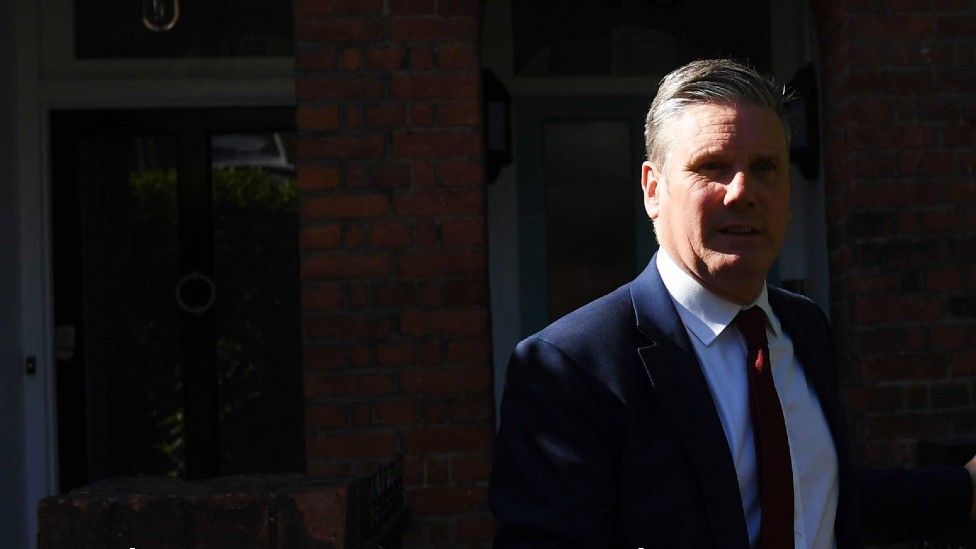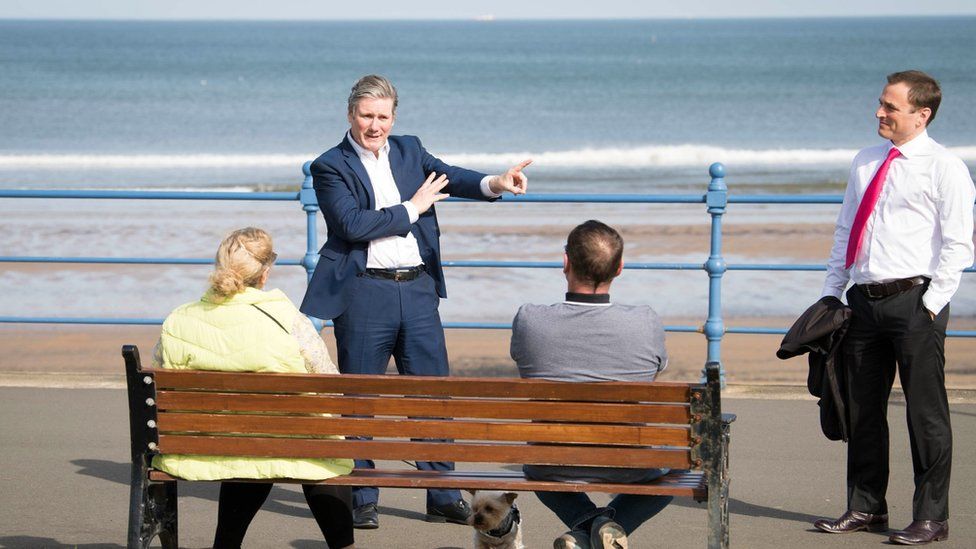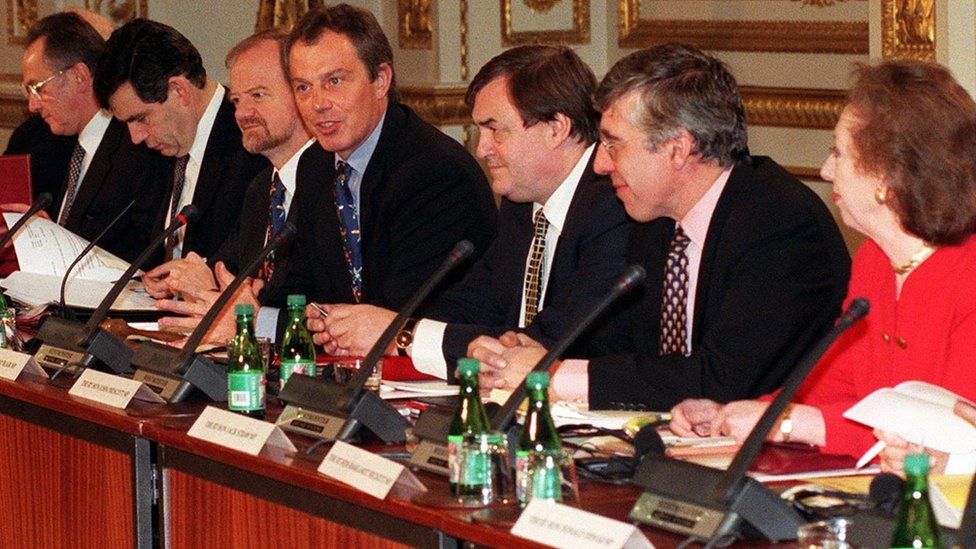Elections 2021: Labour insiders on Starmer, what went wrong and how to fix it
Starmer #Starmer
By Iain Watson & Bex BaileyBBC News

image copyrightEPA image captionOvershadowed by the Tories – Sir Keir Starmer on Friday morning, as the election picture unfolded
Ever since his election as Labour leader a year ago Sir Keir Starmer has emphasised that the party has an electoral mountain to climb. He conquered the foothills pretty quickly – stressing new leadership and even suspending the former leader.
The early emphasis was on eliminating negatives – in particular the stain of anti-Semitism. As long as the new leader continued making steady if slow progress, most of the internal grumbling – or downright opposition – was likely to be limited to the party’s left. And not even all of them.
But slipping back down the mountain has led to nervousness, and restlessness among those he leads.
Starmer faced his first electoral test on Thursday with the Hartlepool by-election. It is a seat Labour has held since it was created in 1974, and defended even as its other red wall constituencies fell in 2019. But, by Friday morning the coastal town in North East England, had switched to Boris Johnson’s Conservatives.
Insiders say the party performed worse than its internal polling had suggested on Thursday – and it wasn’t very positive. But it wasn’t the only significant loss. There was Harlow council in Essex, and in Sunderland it lost ground.
While the pandemic has blunted Starmer’s ability to oppose the government outright, some who supported his leadership are wondering why he is stumbling in much more favourable political weather when it should have been the government that was on the back foot, over “sleaze”.
One of them told us that Starmer’s task now, is “to incinerate the politics of the far left”. Meanwhile some on the left are calling for “radical change”.
Hartlepool blame game
The majority in Hartlepool was always vulnerable. The last time this parliamentary seat was fought, in 2019, the now-defunct Brexit Party took more than 10,000 votes. Many of these were looking for a new home. But it raises questions over Labour’s approach.
Sir Keir Starmer has stressed his patriotism and accepted the Brexit deal. Yet that doesn’t seem to have been enough to detoxify the party’s image among some former Labour, pro-Brexit voters.
But there were other factors.
A prominent politician who spent some time campaigning in Hartlepool blamed the hollowing out of the party during the Corbyn era, with strong organisational, as much as political expertise and experience, lost. Another, who spent a lot of time on the town’s doorsteps, said the party was afflicted by the phenomenon of “long Corbyn”.
One frontbencher said at least people weren’t angry with Labour any more. They just weren’t particularly inspired either.
This, he assessed, was a weird election where people were interested in vaccines and the lifting of restrictions. “People ask me ‘Is the Tory sleaze stuff cutting through?’ The honest answer is virtually nothing is cutting through.”
Others heap blame on Labour’s candidate in Hartlepool – Dr Paul Williams – and how he was chosen

image copyrightPA Media image captionDr Paul Williams, right, Labour’s candidate in Hartlepool, was chosen from a “list of one”
Selecting an NHS doctor as a candidate amid the Covid crisis seemed like the perfect remedy to Labour’s red wall blues. But first Williams had to apologise for sexist social media posts from a decade ago. Then, the Conservatives accused him of playing a part in decisions that removed services from Hartlepool’s hospital, though he pointed to his recent efforts to bring them back.
But the means by which Williams was picked has given critics of Starmer’s office added ammunition. Williams was chosen from a one-person shortlist. He campaigned for Remain in the referendum and lost in a nearby seat in the last general election.
Several Labour MPs – from different wings of the party – are blaming Starmer’s political secretary, Baroness Chapman, for the decision. One told us: “He is her mate but putting him in was a mind boggling decision since Hartlepool is the centre of Planet Brexit.”


The problem for Labour is that Friday’s election results suggest Hartlepool is not exceptional.
In a range of councils covering areas outside the big metropolitan centres, and where a majority voted for Brexit, Labour has slipped back rather than edging forward.
Some majorities were lost but in others – such as Sunderland – they were eroded. One council leader in northern England told us: “The party nationally is just saying to people ‘I’m on your side’. We are not bringing stuff forward to help really transform the lives of people in the North. The party still looks and sounds like a metropolitan, middle class party.”
He confided he has raised “the lack of a message for the North” with the leadership, but “it’s like banging my head against a brick wall”.
Message or messenger?
Concerns over the apparent lack of a message aren’t confined to northern English councillors. An MP who campaigned in Hartlepool and various council contests, had a confession: “I was hoping you weren’t going to ask me to recite precisely what the message is because I think I’d struggle to tell you that.
“This is a fairly bland, vanilla messaging, which seems [aimed at] maximising the minimum number of people who it will offend. What’s our plan to unlock the huge potential of the North? That is still a bit of a blank canvas. And that is a bit of a problem… [I]t doesn’t give us the ammunition that people need on the doorstep.”‘
An MP representing a seat in north-east England put it even more bluntly: “People think we don’t know our arse from our elbow.”
So much for the message – what of the messenger himself?
Those involved in the election campaigns, from all sides of the party, report Starmer has not made enough impact. Many are understanding and like him. Some praise his move away from the Corbyn era and commend his prime ministerial persona. But they say his image with crucial target voters must improve.
“People get a sense of who Boris is and what he’s about,” said one Yorkshire MP. “You know they’ve got the measure of him. The problem with Keir is that people don’t have the measure of him yet.”
This chimes with the view among some in Starmer’s office that the pandemic prevented him – someone who has an interesting backstory and a record of achievement as a lawyer – from being properly introduced to the public. Some of his own MPs believe, though, it’s also about leaving a lasting impression.
“He is hugely capable but in the end, politics is not a meritocracy,” said one, “and it’s not always the best person who prevails. It’s a battle of wills and ideologies. We need to up our game.’
There are harsher verdicts. An MP who is by no means on the left of the party confesses: ”I just don’t know what Keir stands for.” A Labour colleague of theirs from northern England reports this from the doorsteps: ‘Where people comment, they think he is boring.’
![]()
What is to be done?
People from across the party are – remarkably – in agreement about the nature of the difficulties. But there’s not the same consensus around potential solutions. As Starmer struggles with his electoral mountain, it’s like some in the party are shouting “We need crampons!” while others say “Let’s crack open the Kendal Mint Cake and take stock of where we are.”
Some shadow ministers tell us of difficulties in getting access to the leadership, whether it is to give advice or get “attack lines” signed off. They are privately calling for changes to the “engine room” – the Leader of the Opposition’s office – but can’t agree them.
Some on the left want Jenny Chapman, once a leading light in the centrist Progress group, removed, and the departure of Starmer’s chief of staff, Morgan McSweeney. Interestingly, though, a shadow minister not on the left agrees that Starmer needs a chief of staff who can “really hold things together- a more respected political figure”.
Others who want to see changes in Starmer’s office believe Chapman and McSweeney have been outstanding for providing direction, and haven’t baulked at taking difficult decisions. McSweeney is credited by some for aiding Anas Sarwar to stand as party leader in Scotland, rather than await a potentially poorer result under his predecessor, Richard Leonard. They want different changes among the leader’s staff.
On the front foot
Sir Keir Starmer will be very well aware of the “mumbles and grumbles” – as one of his top team put it – around his leadership. That’s why shadow communities secretary Steve Reed was sent round the broadcast studios on Friday morning to assert the problem wasn’t Starmer, but the party. And the leader will “push harder” to change the party, not vice versa.
Insiders say as a reaction to the election results, two things are likely to happen. First, changes in staffing at the Labour HQ, including a strengthening of the communications team. Second, a reshuffle of the shadow cabinet.
A long-standing Labour MP told me that would be a “wily move [helping] stifle criticism in the wake of the elections, as who is going to speak out if they think their job is at risk?”

image copyrightPA Media image captionTony Blair and “big figures” Gordon Brown and Robin Cook (second and third from left), and Jack Straw (second from right)
There is a feeling that many shadow ministers haven’t made enough impact collectively or, in some cases, individually. One frontbencher pointed to some of the “big figures” when Labour was in opposition in the 1990s – Gordon Brown, Robin Cook, Jack Straw – and said Starmer needed five or six “star players” in the top team.
A question of leadership
“There will be no leadership challenge,” a leading left-winger told us.
This is partly due to there being no agreement on who a challenger would be. A prominent colleague of his on the left predicted that if Starmer were to go, it would be due to private pressure from those on the other wing of the party. But installing – for want of a better description – an anti-Corbyn, or more centrist leader, without a contest wouldn’t be straightforward. Not least because the current deputy leader, Angela Rayner, who is popular among members and seen as more left-wing than Starmer, would stand.
This might mean putsch wouldn’t come to shove.
There do not seem to be fully fledged leadership campaigns, but there is a great deal of chatter.
A frontbench supporter of Starmer believes he is safe for now and that the shadow cast by the pandemic has been a long one. But once it dissipates, this backer said “if we are no further forward in a year’s time he is in trouble – we could be just a year away from an election”.
Some on what is seen as the party’s “soft left” are pondering a return to Westminster for Andy Burnham, despite his likely re-election as mayor of Greater Manchester on Friday. Some say they would urge him to consider another tilt at the leadership if the polls haven’t improved in the new year. Others are suggesting Yvette Cooper should offer herself as – at the very least – a caretaker leader, taking the party into the next election campaign.
Policies not personalities?
Starmer doesn’t want to be bogged down by too much baggage as he tries to climb his electoral mountain. So he won’t be spending the summer writing an election manifesto.
But Lord Mandelson, a leading light in the Tony Blair’s New Labour movement, has told the BBC it is time to conduct a policy review, to thin out the bulky 2019 manifesto, and, in the process, develop ideas that may be attractive to target voters.
Policy work has been going on under the radar but internal critics say it lacks definition.
And there is a danger that each solution simply brings another problem.
An analysis by the former shadow cabinet member Jon Trickett, a member of the Socialist Campaign Group, suggests as Starmer tries to woo former voters by stressing his patriotism, he is inadvertently encouraging some more radical, middle class supporters, including former Corbyn supporters, to defect to the Greens.
Indeed, early results show Labour losing some council wards in north-east England to Green candidates. Though this exodus isn’t huge, it could – he argues – cost the party marginal Westminster seats in the North.
Trickett told the BBC “the public have put the leadership on notice”. He has research suggesting many voters in seats that turned blue in 2019 actually share -economically if not culturally – left-wing values, such as agreeing the state should narrow wealth inequalities welfare should be more generous and that corporate greed was a problem.
But a shadow minister, not on the left of the party, said: “Boris Johnson is occupying so much of our territory. He has actually paid people not to go out to work. The state-run NHS has delivered his vaccination programme.”
And at a virtual seminar for Labour-supporting business figures, a prominent pollster told the audience that the party’s (likely) success in London was a double-edged sword. The pollster argued it simply reinforced the perception that Labour was no longer for once-traditional voters in Northern towns.
That perception – rather than policies – was proving a near impenetrable problem.
These difficulties transcend personalities and would provide a challenge for any leader.
But for now it is Starmer and his team who must devise a means of addressing them.